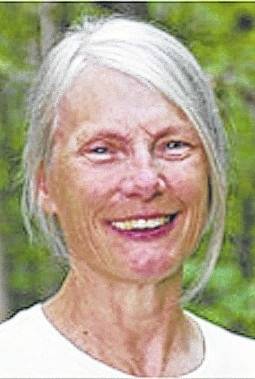
Last Tuesday was a perfect day for volunteers to work at Stratford Ecological Center on Liberty Road. Temperatures were in the low 70s, with a blue sky and a light breeze. The place was bustling, and it struck me that the only time volunteers really stop is to sit down and eat lunch. They find and take pleasure in their own role and smell the roses as they work. In the early years, there were less areas demanding attention, and the staff could usually keep up with it. However, with the creation of a second chicken run, an extended memorial garden, rain gardens, more flower borders, an herb and butterfly garden, seemingly no end of grass to mow, and a wider variety of crops and livestock to manage, it is these volunteers who provide the backbone and allow Stratford to offer so much to the public.
The rains receded earlier this week, allowing Farmer Jeff and the farm hands to cultivate and plant this year’s corn crop in the east side of field 7 and the north end of field 6. The still-wet grass and threat of rain mid-week prevented the start of haymaking. Three 8-week old Tamworth piglets arrived at the end of May. They have settled in well, are very inquisitive, and are already a hefty size. Sassy, our Jersey cow with the dark face, born in 2010 and daughter of Molasses, left for the processors last Tuesday as we began to reduce the size of our herd. She had regained the weight lost last fall when she allowed her heifer calves and two others to suckle her.
A brand new colorful nine-square quilt was hung near “Gale’s Corner” in the Big Room in time for the start of farm camp on June 3. The quilt was inspired by April Hoy, camp director, and pieced by Sandy Smith from a variety of farm camp T-shirts and was quilted by Wendy Bynner. We appreciate their skill.
The first week of the 9- to 12-year-old farm camps was as hectic as expected, but the six camp councilors gradually acclimated. The campers appeared unfazed as some slid on their backs down a muddy woodland path to the stream, leaving quite an impression when you looked at them from head to toe! The kids spend time in the kitchen baking and preparing food from the gardens. The angel food cake rose magnificently, and the mashed sweet strawberry topping was delicious. A dozen purchased round corn stalk bales are providing excellent backing for the archery targets as the campers practice their skills. The bales will later be used to mulch the blackberries, and the peppers and squash established last week in field 3, alongside tomatoes planted deeply in case of drought.
Paul Sandstrom, a farm hand and Salamander soap maker, is now the camp fishing instructor. He replaced farm hand Ed Nagel who retired after years of teaching and supplying sturdy rods. The pond is stocked with bass, bluegill, crappie and amur carp, which the campers catch and release. One girl proudly told me she caught four fish, the most in her group.
School groups and their guides who eagerly visited the pond this spring looking for tadpoles were disappointed. Ironically, during the final week, they were spotted in, of all places, the tractor ruts and hoof prints beside the gate leading to the south pasture at the bottom of the backyard. There was spontaneous delight, and Farmer Jeff assures me they developed into frogs and have since dispersed.
On June 6, nine children aged 8-11 years old from KinderCare Learning Center on West Broad and their teachers, Wilma Lennex and Jama Montgomery, visited to learn about bees from Stratford’s apiarist, Dave Noble. Their blue T-shirts sported the words “Knowledge Beginnings,” which seemed so appropriate. Dave led them out beyond the pond into a clearing in the woods. Here were eight colonies or hives in a semi-circle. Volunteer Devon lifted the top off a hive and exposed the vertical frames spaced three-eighths apart, containing eggs, lava, pollen and honey. Volunteer Becky stood by with a smoldering metal smoker filled with hamster bedding, which she would use to calm the bees should their communication alarm pheromone kick in and they became aggressive. Dave’s philosophy is to remain calm, quiet, and careful; to give a wrong answer to his questions is OK as you will learn and go to bed a lot smarter.
The children were well-behaved, and their attention span exceeded an adult group. They pulled up their hair and donned beekeeper hats to avoid bees becoming entangled in their hair. Dave brought over a frame full of bees and placed one of the few big male bees, known as drones, in their hands. They do not have stingers! Their only job is to mate with a Queen, who is not their mother.
The numerous smaller female bees are called workers, because they do everything from bringing in pollen to feeding the larva, to deciding how many “pre-fertilized” eggs the Queen should produce in a day (on average 1,500 and feeding her accordingly), to collecting the sugar water to which they add spit and acid, and regurgitate as honey, to laying unfertilized eggs in the spring to produce males, and in the fall forcing the males to leave! The children finished their bee experience by pushing their finger into a small area in the comb to taste the white honey. Then they moved to the bird blind to enjoy a well-deserved lunch.
The Herb Group has already started extensive planning for its annual Garden Tea Party for children ages 5-12, accompanied by an adult, from 2-4 p.m. Tuesday, July 16. This tea involves a lot of hands-on, and the children love it. The cost is $20 for a child and adult together. Please register. Further details are on our website. We hope you enjoy your summer and can fit in a trip to Stratford.


